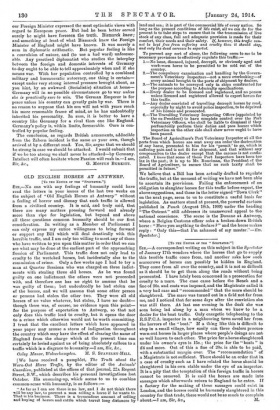E TO 7IIr Lenox or res sesermo."1
Sin,—A correspondent writing on this subject in the Spectator of January 17th wonders where the horses that go to supply this terrible traffic come from, and another asks how such scarecrows of horses can possibly be hidden in England. They come from all over the country, and it is not so difficult as it should be to get them along the roads without being prosecuted. I have lately been concerned in a prosecution for cruelty to a mare. The case came before the Bench and a fine of 20s. and costs was imposed, and the Magistrate called it a very bad case and "recommended" that the mare should be slaughtered. The mare was turned out in a field not far from me, and I noticed that for some days after the conviction she was still there. At lest one evening in the dusk she was seen being led along by a man whom we knew to be a dealer for the boat traffic. Only energetic telephoning to the R.S.P.C.A. inspector in a neighbouring town saved her from the horrors of the "boat." If a thing like this is difficult to stop in a small village, how easily can these dealers procure worn-out horses in larger places where people's doings are not so well known to each other. The price for a horse slaughtered under his owner's eyes is 152.; the price for the " boats " is £4 and more. Out of this a fine of 20s. is able to be paid, with a substantial margin over. The "recommendation" of a Magistrate is not sufficient. There should be an order that in a case of cruelty such as I have related the horse should be slaughtered in his own stable under the eye of an inspector. It is a pity that the temptation of this foreign traffic in horses cannot be removed. It is said the horses are made into sausages which afterwards return to England to be eaten. If a factory for the making of these sausages could exist in London, and the horses could be humanely slaughtered in this country for that trade, there would not be so much to complain about.—I am, Sir, &c.,






































 Previous page
Previous page